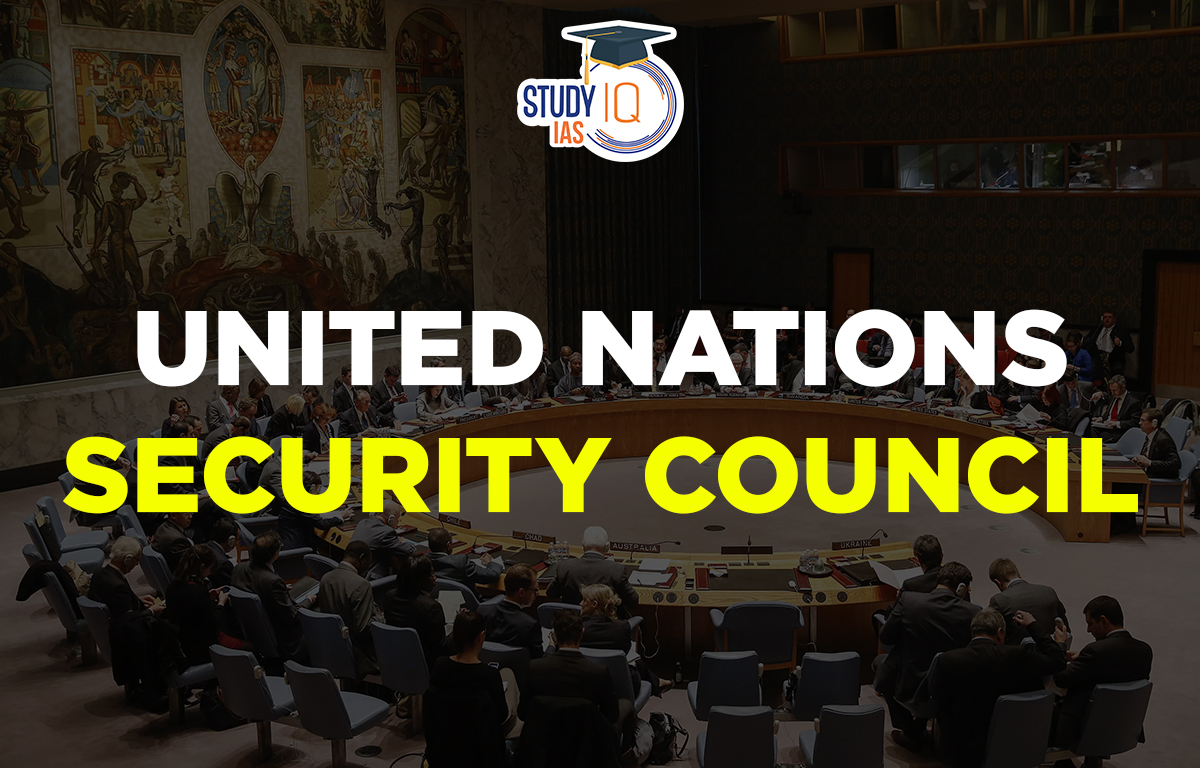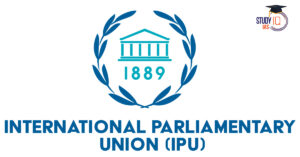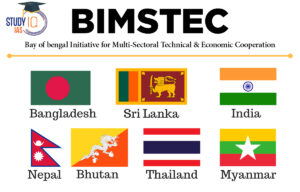Table of Contents
Context: Pakistan, Somalia, Denmark, Greece and Panama were elected as non-permanent members of the UN Security Council for a two-year term beginning in 2025.
United Nations Security Council (UNSC)
- The UNSC, established in 1945, is one of the United Nations’ five principal organs, responsible for maintaining international peace and security.
- The United Nations Security Council (UNSC) is charged with maintaining international peace and security, as well as accepting new members and approving any changes to the UN Charter.
- UNSC has the authority to establish peacekeeping operations, impose international sanctions, and authorise military action through Security Council resolutions; it is the only UN body with the authority to issue binding resolutions to member states.
Composition of UNSC
UNSC is composed of 15 member states, including five permanent members (P5) with veto power and ten non-permanent members.
- The 5 permanent members are the United States, the Russian Federation, France, China and the United Kingdom.
- The 10 non-permanent members are elected for two-year terms by the UNGA (United Nations General Assembly).
- These 10 seats are distributed among the regions of the world: five seats for African and Asian countries; one for Eastern European countries; two for Latin American and Caribbean countries; and two for Western European and Other Countries.
United Nations Security Council Members
| Permanent Members | Non-Permanent Members (with the end of term year) |
|---|---|
| China | Algeria (2025) |
| France | Ecuador (2024) |
| Russian Federation | Guyana (2025) |
| United Kingdom | Japan (2024) |
| United States | Malta (2024) |
| Mozambique (2024) | |
| Republic of Korea (2025) | |
| Sierra Leone (2025) | |
| Slovenia (2025) | |
| Switzerland (2024) |
Non-Council Member States
- More than 50 United Nations Member States have never been Members of the Security Council.
- A State which is a Member of the United Nations but not of the Security Council may participate, without a vote, in its discussions when the Council considers that country’s interests are affected.
- Both Members and non-members of the United Nations, if they are parties to a dispute being considered by the Council, may be invited to take part, without a vote, in the Council’s discussions; the Council sets the conditions for participation by a non-member State.
Role of United Nations Security Council
The UN Security Council’s role in international collective security is defined by the UN Charter, which authorises the Security Council to investigate any situation threatening international peace; recommend procedures for peaceful dispute resolution; and call on other member nations to completely or partially disrupt economic relations, as well as sea, air, postal, and radio communications. The United Nations Security Council was created with certain key features and powers in mind.
Functions and Powers of UNSC
The following are the United Nations Security Council’s (UNSC) functions and powers:
- The UN Security Council’s primary function is to maintain international peace and security. It takes the lead in determining whether a threat to peace or an act of aggression exists.
- Aside from maintaining peace, the Security Council has the authority to send UN peacekeeping missions and impose sanctions on states.
- If necessary, the UN Security Council can also sever diplomatic relations, impose financial restrictions and penalties, blockades, and even collective military action.
Election Process of UNSC Members
On January 17, 1947, the United Nations Council held its first session in London. The United Nations General Assembly elects non-permanent members for two-year terms (UNGA). There is no escaping the fact that we live in a post-apocalyptic world. Members are drawn from all corners of the globe.
- Africa has three members, while Asia, Western Europe, Latin America, and the Caribbean have two.
- Three members are from the African group, two from the Asia-Pacific group, two from Latin America and the Caribbean, two from Western Europe, and one from Eastern Europe.
The five permanent members are granted ‘great power unanimity,’ also known as veto power, which means that if any of these countries veto a resolution, it cannot be passed even if it has the required 9 votes.
- The non-permanent members are elected by the 193 members of the United Nations.
- Elections are conducted through a secret ballot during which the nominees from various regional groupings are voted upon.
- The results of these elections are generally close to unanimous.
Veto Power of P5 Members
- The 5 permanent members have the power of veto.
- Under Article 27 of the UN Charter, Security Council decisions on all substantive matters require the affirmative votes of three-fifths (i.e., 9) of the members.
- A negative vote or a “veto” by a permanent member prevents the adoption of a proposal, even if it has received the required votes.
- Abstention is not regarded as a veto in most cases, though all five permanent members must vote for adopting any amendment of the UN Charter or any recommendation for the admission of a new UN member state.
- The decisions of the UNSC (known as resolutions) are binding on all members of the UN.
India and UNSC
India has attempted to join the UNSC’s permanent membership list but has been unsuccessful. India is not a permanent member of the UNSC despite having a large population, a developing economy, and nuclear power.
India has a better chance of becoming one of the permanent members of the UNSC because it is a member of the G4 (Germany, Japan, Brazil, and India). The following is a list of arguments India made to secure its status as a permanent member of the UNSC:
- India has the world’s fastest-growing economy.
- India just became a state with nuclear weapons.
- India is the world’s largest liberal democracy and the second-largest country in terms of population.
- It has a high purchasing power parity and makes significant financial contributions to UN peacekeeping missions.
India would need to mend its ways with all of the UN members in order to gain the necessary votes for permanent membership, in addition to receiving the minimal number of votes from other UN members.
| India Cuts UN Funding |
|
India Elected as Non-Permanent Member of UNSC
India was elected to the UN Security Council as a non-permanent member in June 2020, receiving 184 of the 193 votes cast at the UNGA. This membership is for 2021-22. For the year 2021-22, India was the only candidate from the Asia-Pacific region. This is India’s eighth visit to the UN Security Council. India had previously been a member in
- 1950-1951,
- 1967-1968,
- 1972-1973,
- 1977-1978,
- 1984-1985,
- 1991-1992,
- 2011-2012.
- 2021-2022
Important Facts related to India being a Non-Permanent Member of UNSC
India is committed to promoting responsible and inclusive solutions to international peace and security, as well as multilateralism, through this non-permanent membership. 5S approach of India are:
- Samman – Respect
- Samvad – Dialogue
- Sahyog – Cooperation
- Shanti – Peace
- Samriddhi – Prosperity
Associated Opportunities
India calls for greater participation of women and youth in shaping a new paradigm. India will collaborate constructively with partners to develop innovative and inclusive solutions to promote development. A rapidly shifting global security landscape, the persistence of traditional security challenges, and the emergence of new and complicated challenges all necessitate a coherent, pragmatic, nimble, and effective collaborative platform to ensure long-term peace.
India will effectively respond to International Terrorism and will combat this menace in all its forms and manifestations. India will pursue concrete and result-oriented Council action aimed at: Addressing terrorists’ abuse of ICT; Disrupting their nexus with sponsors and transnational organised criminal entities; Stopping the flow of terror finance; and Strengthening normative and operational frameworks for greater coordination with other multilateral forums.
Reforming Multilateral System
- For the post-COVID-19 era, multilateralism must be reformatted.
- Bolster multilateral institutions’ cooperation.
- There is widespread worry about the international institutions’ inability to provide outcomes or handle new difficulties.
- The Security Council reform is a crucial first step. To be more useful, it must reflect modern circumstances.
India’s Vision for International Peace and Security
India’s vision for international peace and security is informed by the following principles in order to balance national preference with global priorities:
- Dialogue and cooperation
- Mutual Respect
- Commitment to International Law
New technological applications present encouraging chances to tackle humanitarian issues. India would support collaborations that take advantage of technological advancement for:
- Reduce Human Suffering
- Enhance ease of living
- Build Resilient Communities
Obstacles to Obtaining a Permanent Seat at UNSC for India
While appearing to be a straightforward process, it is complicated by the protests of some permanent members of the Security Council. In particular, China has been resisting India’s efforts to gain permanent membership in the Council. China, which is supported by its partner Pakistan, thinks that giving India a permanent seat at the UNSC will make Indian interests the most important ones in the geopolitics of the subcontinent.
India is moreover regarded as a nuclear power that is expanding. Experts argue that this is the main reason impeding India’s hopes of joining the UNSC.
It would be pointless to give it a permanent seat without demanding any action to limit its nuclear capability. The permanent 5 members are certain that India must give up its nuclear capability in order to join, making India becoming a permanent member of the UNSC appear like a far-off goal as of late 2019. France has recently joined other countries in advocating for India’s permanent UNSC seat.


 International Standards of Accounting an...
International Standards of Accounting an...
 150th Summit of Inter-Parliamentary Unio...
150th Summit of Inter-Parliamentary Unio...
 BIMSTEC Countries 2025, Area of Cooperat...
BIMSTEC Countries 2025, Area of Cooperat...





















